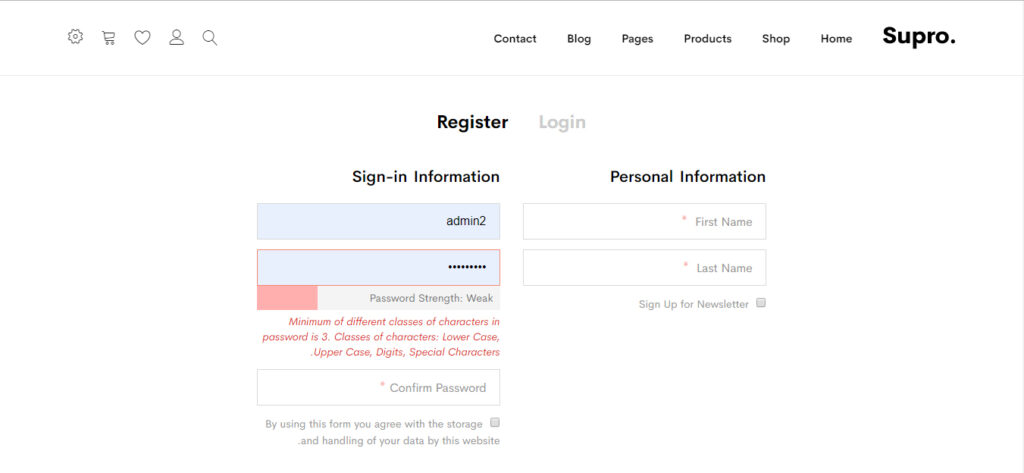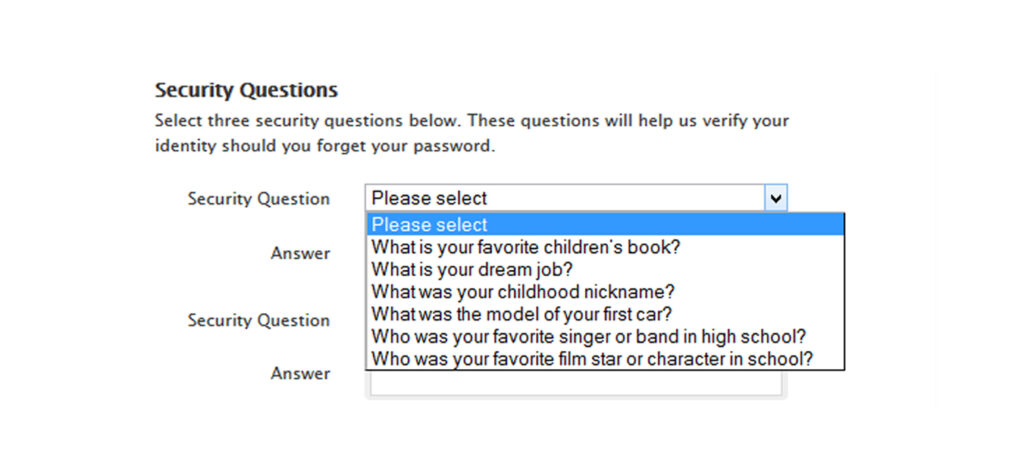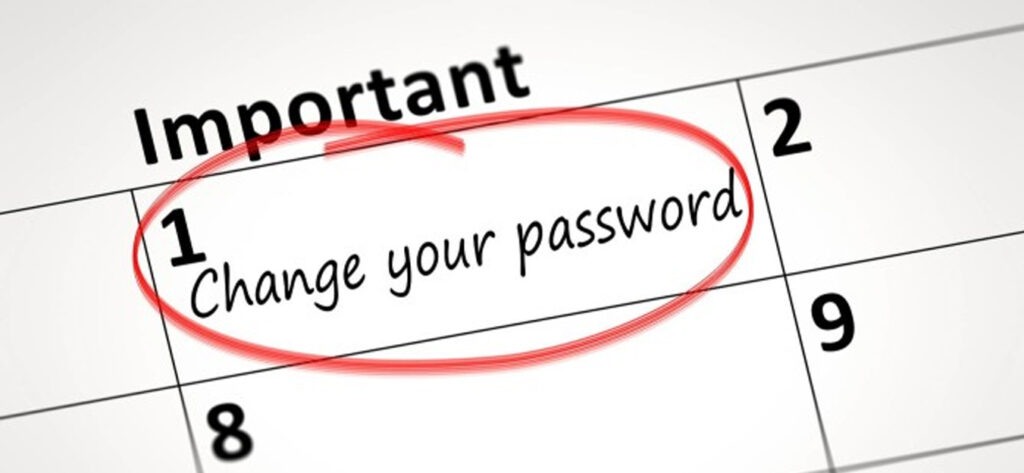It seems like everything you do on the Internet today requires some kind of password, which makes sense considering the number of cyberattacks that happen every day. When you own your own website, it’s even more crucial to create a strong password that will keep your site safe and secure, since upping the ante on your password game is one of the best ways to protect your business. If you have employees who have access to your company’s website, it’s crucial to share with them how to create a secure password. After all, even if you maximize all the steps to creating a strong password, if you’re not requiring your users to do the same, then that’s essentially creating an Achilles’ heel. Stay safe and secure by trying these tips to build a strong password.
1. Make your password long

Weak password warning in Supro theme
Generally, a longer password takes longer to be cracked. If your passwords are six characters or less, it’s time to extend your horizons. The longer and more complex you make your passwords, the more difficult it will be for hackers to ever crack them. Recent studies show that a brute force attack can crack a 6-character password in 11 hours, but it would take 10 years to crack one that is 9 characters. Aim for at least eight letters and/or characters since anything less than that takes less time to crack. The longer the password, the longer it takes to figure it out. TL;DR: If you have more characters, mathematically your password already has a higher probability of not being guessed.
2. Learn from gamers

Strong passwords from gamers that can be learned
Names get taken fast in the online world, which forces people to get creative with their online identities. They will use random numbers, letters, and misspellings. This is done to get the name that people want when that identity has already been taken. You can apply this to your passwords as well. For example, in the online world, an ‘E’ can become a ‘3’, an ‘A’ can become a ‘4’, an ‘O’ can become a ‘0’, and so on. Misspellings are also helpful when gamers want to create an identity for themselves. Change a ‘Z’ to an ‘X’, add an extra ‘R’ or ‘S’, or change an ‘S’ to a ‘Z’. For example, the name “The Agent Zero” can become something more crafty like “Th3 4g3nt X3r0”. Use this premise when creating your strong password, think of a spelling that nobody else would ever consider.
3. Multi-factor authentication

Multi-factor authentication for a better protection
Any extra protection you can take is a good idea, and multi-factor authentication means that merely having your password won’t be enough. Multi-factor authentication adds multiple layers of security for protecting access to your accounts, making the cracking process much more difficult. In recent years, many businesses have already been using multi-factor authentication to protect their clients’ information – you too should enable it wherever you can. This way, if anyone ever breaks through your password, you will be notified immediately so you can reset it and kick the hackers right out of your account.
4. Don’t reuse your password

Weaken the password’s strength by reusing a password
When hackers complete large-scale hacks, as they have recently done with popular email servers, the lists of compromised email addresses and passwords are often leaked online. They also know that if they are successful in breaching a single account, they will often be able to access multiple accounts for the same person due to the high frequency of password reuse. So, the more you reuse passwords the easier it is for an attacker to gain access to every account that uses that same password. In other words, don’t reuse your password in multiple accounts, even if it is a strong password.
5. Use a strong password manager

Use a password manager for a strong password
If you’re creating passwords the right way — meaning they’re long, with lots of numbers and characters, and on the gibberish side — it’s probably pretty tough to keep track of all of them. That’s where a password manager comes in. They allow you to have multiple passwords for all of your accounts and it remembers them for you. Password managers are services that auto-generate and store strong passwords on your behalf. These passwords are kept in an encrypted, centralized location, which you can access with a master password. Using a password management application will enable you to create stronger passwords since you won’t have to remember each one.
6. Don’t store passwords in your browser

Avoid saving your passwords in your browser
We know what you’re thinking: keeping passwords in your browser means they’re always at your fingertips. But like many other shortcuts in life, it just isn’t worth it. While strong password managers are security companies designed to protect your data, the same standards don’t apply to browsers for password management. Furthermore, passwords stored in a browser can’t be used for native applications and are also not available on your other devices or on other browsers. Passwords stored in a particular browser are not cross-platform, and browsers are not military-grade ‘vaults’ for securing and organizing your passwords and other private information.
7. Avoid using obvious personal information

Using too obvious personal information is forbidden
If there is information about you that is easily discoverable such as your name, birthday, user name, or email address, you shouldn’t include them in your password. These only make your password easier to guess. In other words, this type of information is often publicly available, which makes it easier for someone to guess your password. On that note, if you are required to brainstorm a strong password when creating an online account, think about the one that is not obvious to someone browsing your social media accounts.
8. Use security questions wisely

Wise use of security questions for a strong password
Though security questions might seem like they’re there to help by adding an extra layer of protection, they can actually do more harm than good. If possible, it’s best to avoid security questions because they tend to be questions of very common things about yourself. But if you do have to use them, we recommend setting a customized security question and answer to prevent hackers from planning a brute-force attack against common security question and answer lists. In other words, be creative with your answers and record that data so that the information can’t be easily found via social media.
9. Change your passwords regularly

Regular changing for a strong password
The more sensitive your information is, the more often you should change your password to increase your account’s protection strength. Once it is changed, do not use that password again for a very long time. That way your account will be secured more than ever.
Conclusion
That may sum up 9 essential tips to create a strong password. As passwords keep all of your information safe, make an extra effort to make them strong. Take these tips, improve on them and keep hackers away from your information. A surefire component of keeping website security is enforcing the use of strong passwords. However, passwords are just one piece of the protection puzzle. To create a safer environment online, you will also want to use a firewall and other security products that help keep hackers out of your system and protect your identity online. If you have any questions, contact us via our website. Or you want to improve the security of your eCommerce store, you can visit our eCommerce testing and enhancement service.



